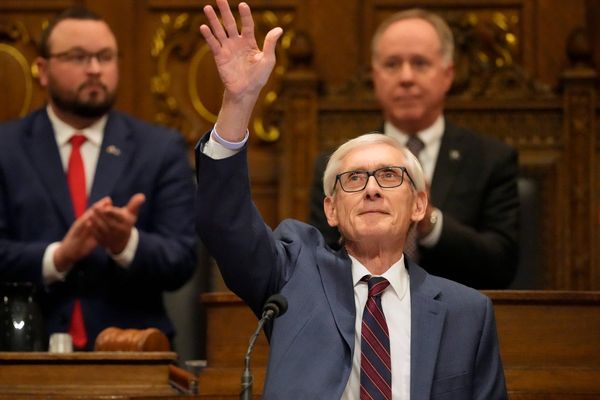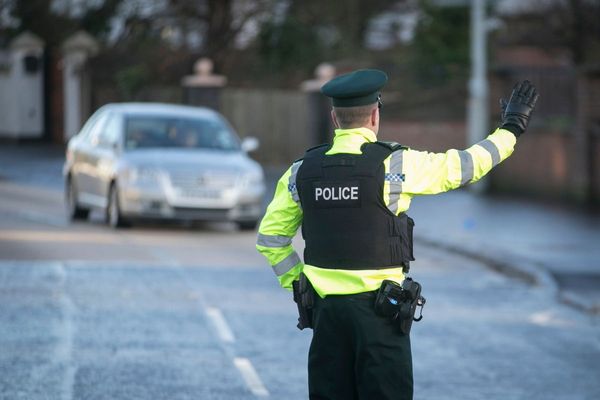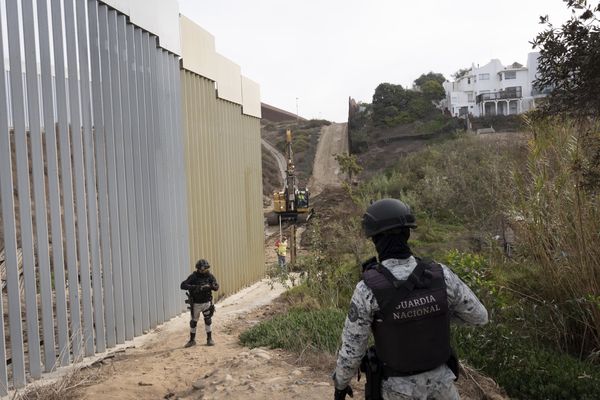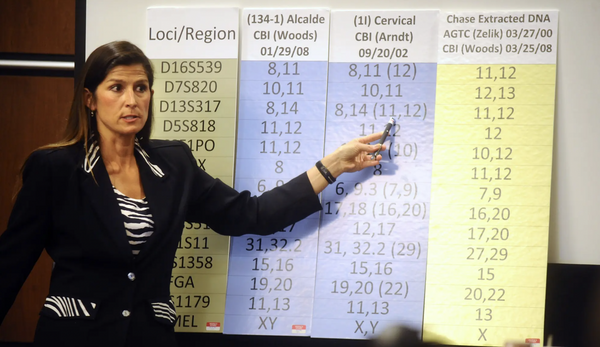
In March, Victorian Opposition Leader John Pesutto released a statement on the latest neo-Nazi protest at the steps of Victorian Parliament in which he condemned the “shameful individuals and the hateful ideology they push”.
The statement stood out for its strong, unequivocal language. That says something. It says it is no longer guaranteed that neo-Nazis will be unequivocally condemned in terms that leave them with no place to hide, whether in our political parties, social movements or society more broadly. It seems “How will the neo-Nazis feel?” is becoming a real electoral consideration.
I am not joking and I wish I was exaggerating, but Pesutto’s stance has made his leadership weaker. On Saturday he was booed and heckled at the Liberal Party’s state council in Bendigo by supporters of Moira Deeming. This spectacle began when Pesutto initiated proceedings to expel Deeming over her involvement in an anti-transgender rally that attracted the support of neo-Nazis, a separate neo-Nazi rally from the aforementioned one.
Pesutto also condemned that rally and went further by seeking to expel Deeming. In the end, she survived the push for expulsion. Yet the drama didn’t end there.
In what would rival any episode in any reality television franchise anywhere, Deeming issued a statement threatening to sue Pesutto for defamation. With this threat at the leadership, a second expulsion push commenced. Deeming backtracked and released another statement denying she planned to sue. In return, Pesutto confirmed he did, in fact, receive a defamation-concerned notice from Deeming’s lawyer. This time Deeming did not survive expulsion.
Lost the play but not the game
It seems Deeming miscalculated in a manner the young and the hip would surmise as: “You played yourself.” Yet she may have lost the play, but she hasn’t lost the game. This weekend her supporters booed and heckled Pesutto. The results are that Pesutto’s leadership is reported to be under more stress than before. And despite avoiding a potential federal takeover by Opposition Leader Peter Dutton, the party is spilt and still a floundering in ideological disarray.
To settle this dispute, Deeming demanded that Pesutto make a public statement that exonerates her “from all allegations and imputations” that she is a Nazi or Nazi sympathiser. She appears to be aware only strong and unequivocal language can dispel allegations and imputations to clear her name.
I can only say: same. Like Deeming, but for different reasons, I appreciate the use of only strong and unequivocal language for certain things — like condemning Nazis. Silence is not enough. And statements hanging on some vague expression of “freedom of speech” or “broad church” wouldn’t cut through to leave no imputations that Nazis have no place, no place at all, in our political life or social movements.
Yet to have this expectation for clear condemnation, an expectation that Deeming claims for herself and for which she clearly understands its social value, is treated as unfair attack through guilt by association. The opposition is that to maintain this expectation is unwarranted because it assumes an association that must be dispelled. What is expected instead is that in in good faith we assume no association exists even with the presence of neo-Nazis at your events.
That view is not without merit. What weight to give to the merits of that view, however, is not informed only by the style of debate we adopt, but also the political realities of our times. The need for unequivocal condemnation might not be great if the threat is theoretical. It is not.
Principle of white supremacy
The core idea of neo-Nazis and far-right extremist is white supremacy. In the United States, white supremacists and other far-right extremists are “the most significant domestic terrorism threat” according to a bill presented to the US Congress. Here the Australian Security Intelligence Organisation (ASIO) warns the neo-Nazi threat is becoming a significant security challenge, especially as these hate groups are becoming more organised and “politically” sophisticated. The threat is real and growing.
A key player in the neo-Nazi scene in Australia involves the neo-Nazis who rallied twice at the steps of the Victorian Parliament this year. They are Australia’s largest neo-Nazi group and have been linked to the Australian white supremacist who killed 50 Muslims in Christchurch, New Zealand, as they worshipped. The Christchurch royal commission report revealed that the shooter was an “an active member” of the online groups run by the neo-Nazis who organised the Melbourne rallies. Years before his killing he had voiced support for their leader at the time calling him the “emperor”.
The Christchurch terrorist is also linked to the current leader of the neo-Nazis, Tom Sewell, who organised and led both rallies. Sewell is mentioned in the Christchurch royal commission report. He had previously approached the shooter to join his group. The shooter turned him down so he could commit his massacre. The youngest victim was three-year-old Mucad Ibrahim who ran towards the gunman. He killed him. This brutality, this cruelty, this senseless violence is today a source of inspiration to the neo-Nazis who used the footage of the massacre as a recruiting tool and see the terrorist as a hero.
These are the political realities of our times.
Guilt by association
When you add to these realities the known facts that neo-Nazis groups are interested in infiltrating Australian politics “by having candidates elected and lobbying conservative politicians to drive them to the far right”, and they are sophisticated enough, according to the ASIO chief, to “not openly showing their true ideology and not openly showing their violent beliefs or their use of violence”, the issues of guilt by association become far more complex.
The expectation that politicians, or leaders of social movements, denounce neo-Nazis in explicit terms, in my view, is the bare minimum of leadership needed for our times. It does not matter whether they gatecrashed your movement or your political party. The fact that they think you have something in common should be concerning enough to distance yourself from a group that celebrates genocide as a source of inspiration for humankind.
If leaders of political parties or movements remain silent, or refuse to condemn neo-Nazis who highjack their programs, and cannot unequivocally condemn, we cannot unequivocally claim you have no associations. All we can assume and say is that we do not know where you stand. That is a cautious approach for serious times. This, however, is not a complete answers to the issues.
The problem, for people like Deeming and the Liberal Party is that association isn’t one-way. Even if you claim you are not associated with neo-Nazis, neo-Nazis can believe they are associated with you. It is not by coincidence that it is the conservative political parties that are the targets of neo-Nazis desire to infiltrate Australian politics and turn them into instruments for their “hateful ideology”. It is not accidental that they gatecrash the anti-trans protest in support of the anti-trans movement. Nor is it by chance that 48 hours after Dutton’s budget reply linked migration to concerns about housing and infrastructure, neo-Nazis staged an anti-immigration rally calling to stop immigration and for “living space for whites”.
Finally, it was not destiny that Dutton led the racially charged “African gangs” campaign and neo-Nazis responded by holding rallies against African gangs. As Andrew Gillum said to Ron DeSantis after his too many coincidences with white supremacists and neo-Nazis: “I’m not calling Mr DeSantis a racist. I’m simply saying the racists believe he’s a racist.”
The same can be said here. It is not that Deeming and the Liberals are neo-Nazis sympathisers, it is that neo-Nazis believe they are neo-Nazi sympathisers. This is why leadership matters. This is why language matters.
Language matters
The leadership needed is one willing to use the languages required by our times and political realities. Unequivocally condemning groups such as neo-Nazis isolates them and provides them with no rhetorical covers while stripping them of any legitimacy to participate in public debate. Such leadership sets the tone and gives others confidence in the leader’s stance. Of all things, it is the lack of leadership, or what goes for leadership, that is most concerning — especially on the political right.
We no longer seems to have political leaders; we seem to have entertainers, and worse, people whose public conduct is closer to a YouTube star or a social media influencer. In part this is because the Australian political right has been captured by Australia right-wing media. That relationship has transformed the nature of conservative parties as normal political parties and the character of their leaders as political leaders.
Instead of governance we have entertainment. In place of considered policy debates, we are subjected to slogans, rage-bates, race-bates, or just plain governance by “shit-posting”. In this environment, it does not seem out of place that a potential future prime minister would describe a large part of “his” population as “dirty lefties”. It is as if he could never owe them anything.
But dirty lefties or not, these are Australians for whom any Australian prime minister owes a duty by virtue of public office. Of course this style of leadership is not contained to the political right; it can be found in many sectors. On the right, however, it seems far more consequential.
The consequences are there in the effects of climate-change denialism, despite climate change being a threat to our ecology, economy and national security. It is there in the opposition to the Voice which conservative politicians first supported and then abandoned. What is next is whether this leadership will fail us in its response to far-right extremist and neo-Nazis threats.
The response so far has not been encouraging. It is hard to believe a person who can’t condemn a thing in strong words will oppose the thing with strong deeds.







